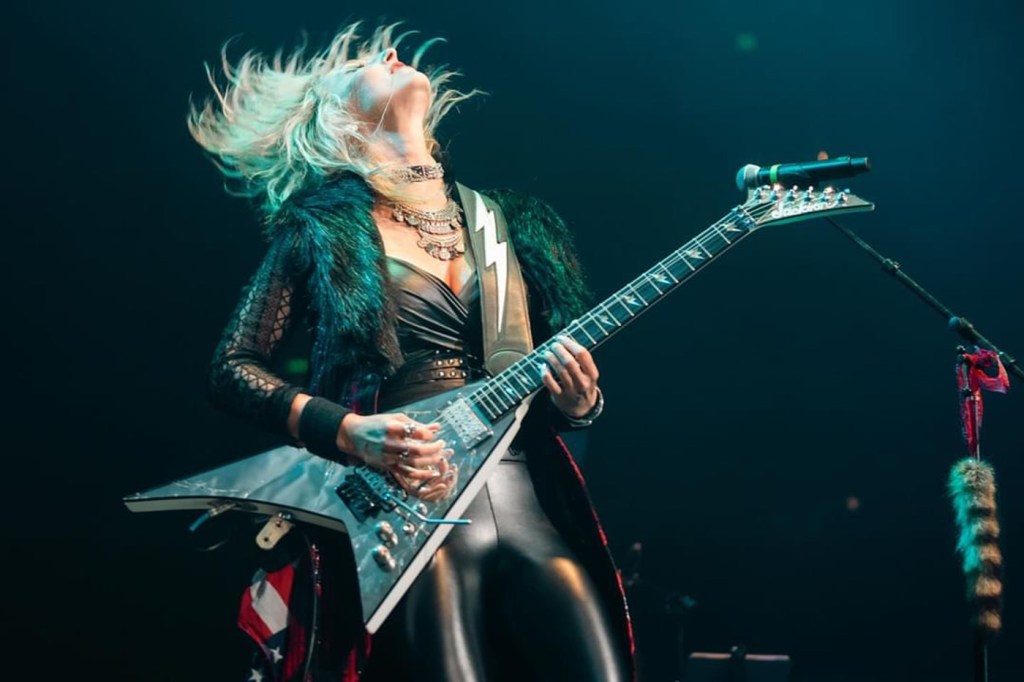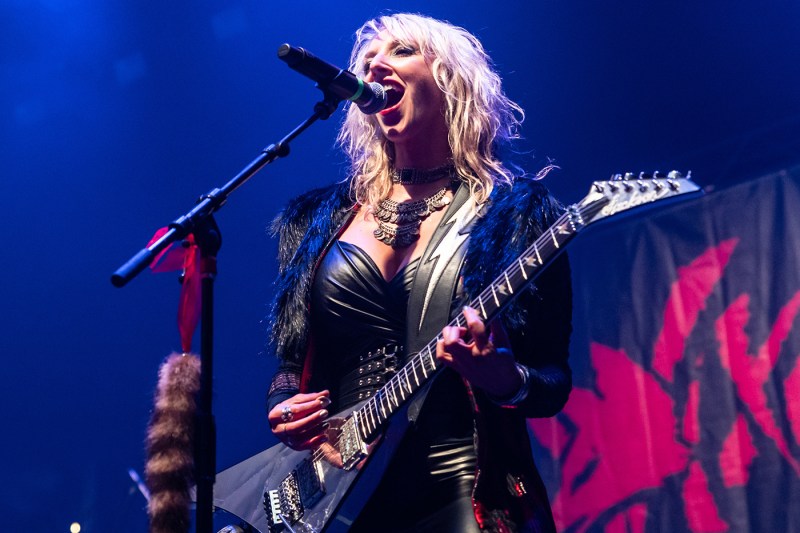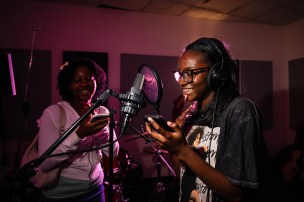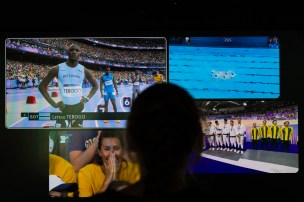Published on
She got her name from a childhood lightning strike. Then this Northeastern grad electrified the rock scene
The virtuosic lead guitarist Britt Lightning has played for acts including Vixen, Rachel Platten and Jason Derulo. She’s used her music business degree to craft a multifaceted industry career — onstage and off.

Where does the name “Britt Lightning” come from?
One might assume — correctly — that the musician born Brittany Denaro adopted the moniker to suggest the combination of speed, dexterity and flash for which her virtuosic electric guitar work has earned a reputation. Over two decades as a touring lead guitarist, Lightning has dazzled audiences around the world, from arenas in Mexico to death metal festivals in Finland.
“When I started my first band, I was like, ‘Oh, man, that would be the perfect stage name,’” she says. “It’s bright, it’s electric, it’s fast. That’s everything that I want in my playing.”
Also, she was struck by lightning.
Once, as a kid, “I was playing Nintendo really close to the TV during a storm,” Lightning remembers. A bolt hit the side of the house, traveled through the power cables, “arced off, and actually hit me. I thought, ‘Maybe I have superpowers now.’”
Lightning is relaxing backstage between sound checks at Tupelo Music Hall in New Hampshire, where Vixen, the ’80s arena rock band she’s played lead guitar with since 2017, is headlining. For now, the 2009 Northeastern University graduate is dressed comfortably — in a black Adidas tracksuit with leopard trim, offsetting a bleach blond ponytail.
Later, she’ll change into her stage wear — shredded leather leggings, boots with rhinestones and a long, red and black topcoat with faux fur trim and a silver lightning bolt emblazoned on the back. Mounds of silver jewelry — rings on the right and bracelets on the left, where they can’t jangle against the body of her new Gibson Les Paul — are placed to make way for her right-handed playing.
That playing is front and center during the band’s set, which is brimming with upbeat glam metal songs structured to showcase flashy guitar solos. Formed originally in 1980, Vixen is probably best-known for “Edge of a Broken Heart,” a radio hit in 1988. But the audience never gets antsy for the band’s biggest song and obvious finale; the show is loud, polished and happy, with catchy hooks, tight instrumentals and lush, four-part vocal harmonies throughout. Lightning grins the whole time, totally at home as she tackles the intricate licks in nearly every bridge.
“You’ll just see us having fun,” she says. “I love being on stage surrounded by strong, amazing players who are like sisters. We uplift each other.”
Lightning has wanted to do this — exactly this — since, as a 15-year-old in North Reading, Massachusetts, she heard Eddie Van Halen’s “Eruption” playing over the speakers in a Ralph Lauren outlet while shopping with her mother. Now 39, she specializes in that brand of guitar-centric rock, and it has taken her all over the world. She’s been the “Slash” in the Guns N’ Roses tribute band Paradise Kitty, and featured in the backup bands for pop acts including Rachel Platten (“Fight Song”) and Jason Derulo (“Whatcha Say”; “Ridin’ Solo”). For three years, she played on a global stadium tour with Alejandro Sanz, a multi-platinum superstar in the Spanish-speaking world.
Along the way, she picked up a music business degree from Northeastern, graduating with honors. That education has enabled her to manage the financial and logistical aspects of a performing career on her own, as well as make inroads into the other side of the business. As a student, she co-oped at LiveNation and took classes in copyright law. When she’s not on tour, Lightning serves as the artistic director of Rock ‘n’ Roll Fantasy Camp, where she teaches, books the company’s celebrity counselors, and hosts a popular series of Zoom masterclasses with rock legends.
I’m grateful every day that I get to call this work.
Britt Lightning, professional guitarist and 2009 Northeastern music business graduate
The role has provided Lightning a rare island of stability in the chaotic sea of life as a touring musician — where travel is relentless, sleep and decent food are precious, and gigs can dry up out of nowhere. It has also allowed her an additional platform to encourage other women in and around the male-dominated industry. In 2024, Lightning received a She Rocks Award, which honors trailblazing careers in music.
Her time at Northeastern “has been super helpful,” she says. “There are so many musicians I know who don’t know how to read a contract and get taken advantage of, or they’re paying crazy lawyer bills,” she says. “I don’t. I pretty much always negotiate for myself and figure everything out.”
According to Lightning’s parents, she’s been figuring everything out for herself since the beginning. Ardent fans, they cheer her on at gigs whenever possible; tonight in New Hampshire, her mother, Michaela Denaro, is sporting a black tank top with her daughter’s name and face on it.
“Any [show] I can get to that I don’t need a passport for, I’ll go,” she says, before reconsidering. “I did need one for Costa Rica.”
Their eldest daughter’s path has been a delightful curveball for the Denaros, who aren’t musical at all. Growing up, “all I really remember is listening to Christmas music,” Lightning says. Her mom would occasionally exercise to disco tunes; her dad, Paul, loved Hank Williams. “But we didn’t always have music going in the house.”
Her first exposure to rock came at age 12, when a babysitter brought over albums from The Offspring and Bush, a pair of popular acts in the 1990s. “I thought it was the coolest thing ever,” she says. “I was obsessed with those two records; I know them inside out now.”
But things didn’t really get going until that day she heard “Eruption.” After asking every Ralph Lauren clerk in sight what song she was hearing, she persuaded her mom to stop at a Newbury Comics store, where she bought two Van Halen CDs and never looked back.
“At the time, all I wanted was to be able to play that,” she says.
Featured Posts
Attending a Catholic high school, she took her first lessons with a teacher, Mr. Russo, and was the only girl in Guitar Club. Her first performances came as part of the school’s liturgical services. At home, Lightning practiced for hours every day on her first guitar, a purple Ibanez. (Now, she has sponsorships with Epiphone and Taylor, as well as a pair of custom-built Jackson Flying Vs.)
“Once she picked up that purple guitar, I knew music would be in her life forever,” her mother says.
Lightning started playing clubs and bars around Massachusetts before she could drive, and the gigs were family affairs. Her younger sister, Abbey, played bass in her first band, Jaded. Michaela sold merch, and Paul was their roadie, hauling gear in the family’s Chevy Suburban. “They were such troupers,” Lightning recalls fondly.
Around the same time she started looking at colleges, Northeastern launched its music business program, which combines standard music theory, history and performance curricula with training in things like accounting and contracts — as well as firsthand experience in the industry through the university’s co-op network.
“I loved the idea of the co-op program, because I was ready to work,” Lightning says. “Like, let’s go. I was already out experiencing things, playing in bands.”
On campus, she took copyright law and industry classes with David Herlihy and fundamentals like sight reading and theory with Leon Janikan. She took a year off in between, touring Europe with Jaded.
“I remember going into her dorm room and it was all posters of 80s hair and metal bands,” says Claire Frajnd, a 2006 graduate who lived with Lightning their sophomore year. Frajnd went to Jaded gigs nearly every weekend for a while, occasionally doing the band’s makeup. “She was constantly practicing,” Frajnd says of her former roommate. “She did her schoolwork, obviously, but she was diligent about doing her guitar exercises with these little instruments I’d never seen.”

Since graduation, some of Lightning’s biggest breaks in the industry have come thanks to a gig she didn’t land. In 2011, Lady Gaga held open backup band auditions, gearing up for a tour. Lightning kept getting callbacks, making it to the final two guitarists up for consideration. The pop star asked her to “do something to impress me.” She did, launching into a trademark flashy solo.
At the end of the audition, Gaga looked at the guitarist and told her, “I’m going to call you The Closer. When a baseball team needs to wrap everything up and seal the deal? That’s you.”
Lightning was devastated when she didn’t get the job. But a few months later, a member of Alejandro Sanz’ team, who had seen the audition, booked her. Years later, another contact from the Gaga callback invited her to try out for Vixen. “I got so many gigs from that one audition,” she says.
Lightning lived a fully nomadic rockstar lifestyle during her years touring with Sanz, learning to speak fluent Spanish and living out of a suitcase for weeks at a time in Europe or Brazil. Though nominally based in Los Angeles, she didn’t even rent an apartment. The travel was relentless.
“Musicians get paid to travel,” Lightning says. “We play the gig because we like music, but we get paid to travel. I’ve flown to South America for one 30-minute set and then had to turn right around and come right back for another show in the States.”
These days, the pair of steady gigs with Vixen and Rock ‘n’ Roll Fantasy Camp have lent her a degree of predictability elusive to many working musicians. Vixen is still making new music and plays about 40 dates per year, ranging from more intimate venues like Tupelo Music Hall to massive festivals in Europe and Latin America, where the group’s brand of guitar-centric rock is still hugely popular. Last year, they played Wacken Open Air, a storied German heavy metal festival that draws 85,000 attendees each year. At Rock ‘n’ Roll Fantasy Camp, she has recently spearheaded a “women-only” series, working with stars including Melissa Ethridge, Nancy Wilson and Wynonna Judd.
It’s hard not to notice that throughout her career, Lightning has found herself in spaces not just dominated, but monopolized, by men. When she first tried to join Guitar Club in high school, the supervising teacher assumed she was only hanging around because she had a crush on one of the boys. Statistically, virtually no women were signing up for guitar lessons when Lightning took up the instrument — something that has flipped entirely in recent years thanks to Taylor Swift.
During Vixen’s heyday, girls playing hair metal were such novelties that the list of comparable commercial acts — Joan Jett, Heart — can be counted on one hand. Before the “women-only” camps started up, only five or six participants in each of Rock ‘n’ Roll Fantasy Camp’s 80-person sessions were women.
At times, the imbalance borders on comedy: One of Lightning’s favorite Vixen shows was at a rainy death metal festival in Finland, where the band walked onstage and found themselves face to face with a sea of mud-covered, hulking men. “It was like all Jason Mamoas out there,” she laughs.
Throughout, her response has been to be too good to be denied — and happy about it. She became president of Guitar Club. Her first band — and subsequent ones — have been made up of women playing aggressively male-associated music without apology, from Guns N’ Roses to the Latin pop of Sanz, for whom she was one of the first female backing musicians.
And at that Finland festival, the Viking-esque crowd sang along to every word of Vixen’s soaring love anthems.
“I’m grateful every day that I get to call this work,” Lightning says. “I don’t take it for granted.”
Schuyler Velasco is the campus & community editor for Northeastern Global News. Email her at s.velasco@northeastern.edu. Follow her on X/Twitter @Schuyler_V.











